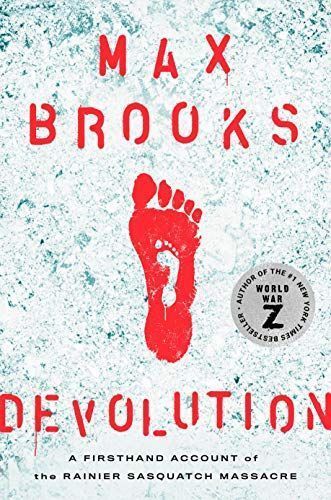
Devolution A Firsthand Account of the Rainier Sasquatch Massacre
The #1 bestselling author of World War Z takes on the Bigfoot legend with a tale that blurs the lines between human and beast--and asks what we are capable of in the face of the unimaginable. As the ash and chaos from Mount Rainier's eruption swirled and finally settled, the story of the Greenloop massacre has passed unnoticed, unexamined . . . until now. But the journals of resident Kate Holland, recovered from the town's bloody wreckage, capture a tale too harrowing--and too earth-shattering in its implications--to be forgotten. In these pages, Max Brooks brings Kate's extraordinary account to light for the first time, faithfully reproducing her words alongside his own extensive investigations into the massacre and the legendary beasts behind it. Kate's is a tale of unexpected strength and resilience, of humanity's defiance in the face of a terrible predator's gaze, and inevitably, of savagery and death. Yet it is also far more than that. Because if what Kate Holland saw in those days is real, then we must accept the impossible. We must accept that the creature known as Bigfoot walks among us--and that it is a beast of terrible strength and ferocity. Part survival narrative, part bloody horror tale, part scientific journey into the boundaries between truth and fiction, this is a Bigfoot story as only Max Brooks could chronicle it--and like none you've ever read before.
Reviews
Joe Mccaffery @five235
Zugzug@zugzug
Amulya Garimella@agarimella
Lara Engle@bzzlarabzz
rumbledethumps@rumbledethumps
ams@ghostams
Janice Hopper@archergal
McKayla Bohnsack@mkrae
Cheri McElroy@cherimac
Maggie Gordon@maggieg
Elizabeth Neill@beersbooksandboos
Cindy Lieberman@chicindy
Lauren Attaway@camcray
Rob Erekson@roberekson
Jeremy Anderberg@jeremyanderberg
Megan White@chapterswithmeg
Deborah Kerr@debbie
Kelsey Holtaway@kelsey
Melea Mullican@mel_lenore
Ashlie Oliver @therealashlieoliver
Bryan Alexander@bryanalexander
Ryan Lane@dahryanel
Novel Ideas@efrali
erin alise @thehollowvalley